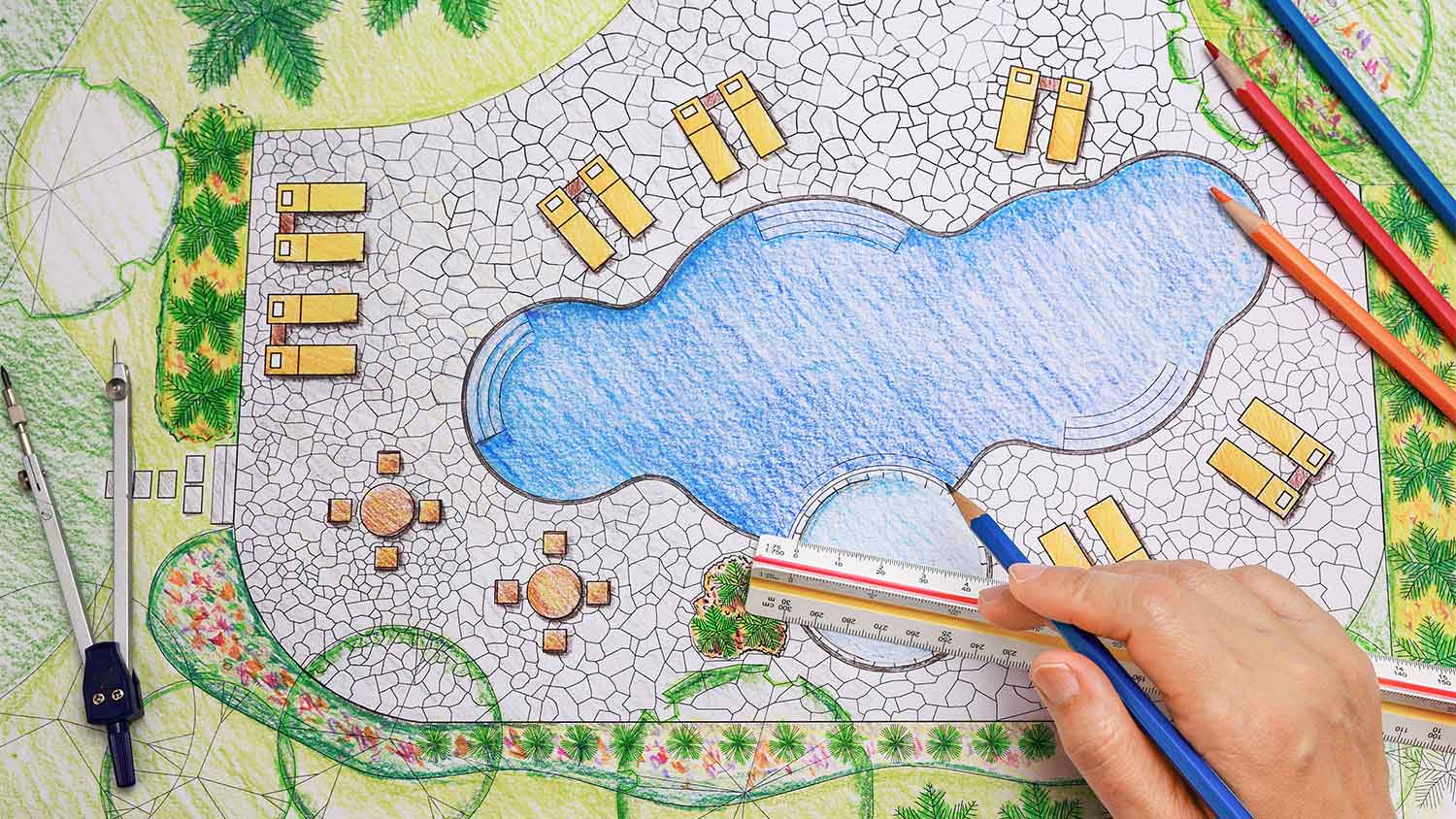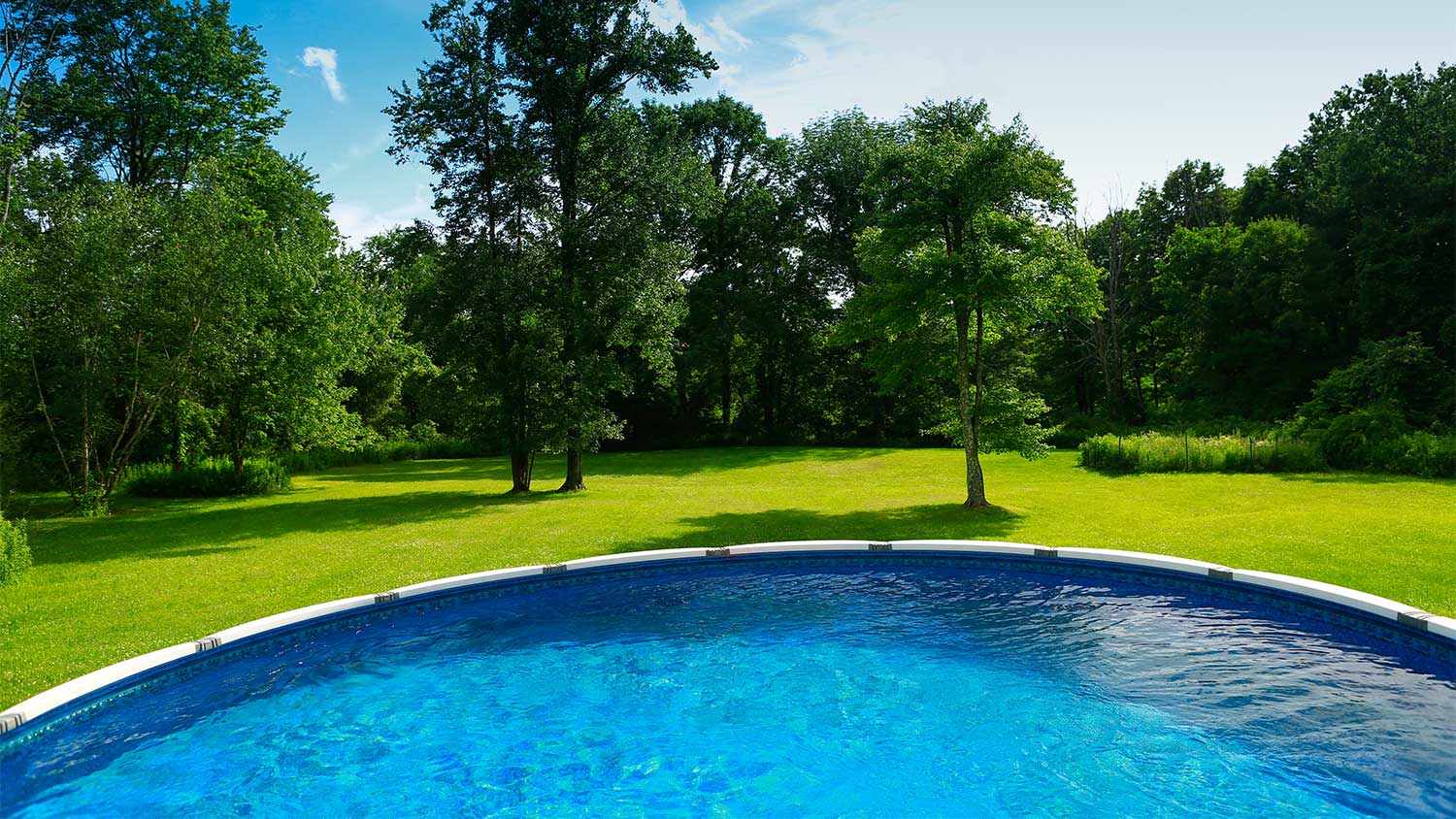Pool Building Timeline: How Long Does It Take to Build a Pool?
The splash is worth the wait


Straightforward pool designs take eight to 12 weeks.
Vinyl liner pools take as little as 10 days, while concrete pools take months.
Permits can delay the pool-building process by a few months.
If you’ve decided to take the plunge and build a pool in your yard, there’s no time like the present to start planning. But how long does it take to build a pool? Generally, an average-sized inground pool will take 12 weeks to build, whereas a typical above-ground pool will take less than a week—sometimes less than two days. The timeline varies depending on the pool’s size, shape, material, and the length of the pool design process. Read on to learn all the different factors that will impact your pool-building timeline so you’ll be ready to make a splash as soon as possible.
Swimming Pool Construction Timeline

It takes a minimum of 8 to 12 weeks total, on average, to build a pool. To understand the timeline better, learn the various steps of building a pool, from planning to that first cannonball.
Dream Up a Design and Hire a Contractor: 1 to 8 Weeks
The first step is to imagine your dream pool in your backyard. How big is it? Is it a standard rectangle, or do you imagine something more unique? Will you be landscaping the area around the pool? Flip through home magazines, look at inspirational pictures on Instagram, and note what friends and family have installed to help you choose a design. You can even write up an initial list of questions to ask the pool designer.
Once you have some sketches and a mood board with your grand ideas for your pool, it’s time to contact a local pool contractor to turn those dreams into reality—or, for now, 3D renderings. Typically, the design process takes about three weeks from start to finish.
Obtain Necessary Permits: 2 to 6 Weeks
Unfortunately, you don’t know how long it will take to get permits for your pool. Every municipality is different and has its own unique rules around building residential pools. The permits could take one week, or they could take months. Talk to your neighbors with pools to see how long it took them to get permits.
Land Preparation and Excavation: 1 Week
After you have secured a pool contractor, solidified the design, and determined the cost to build your pool, it’s time to begin excavating and prepping the land for the pool. This might include removing obstacles such as large rocks or trees or redirecting utility lines so they are safely out of the way. Depending on the weather, impediments, and size of the pool, this process can take anywhere from a few days to several weeks.
Install Steel, Plumbing, and Electrical: 1 to 2 Weeks
The steel frame is the skeleton of your pool, giving it its structure. Proper plumbing and pipe installation are necessary to run your pool filter, pump, and heater. Finally, the electrical wiring allows you to switch on the fun stuff, like lights, heaters, and water features. All in all, these three necessary components will require about two weeks of work.
Place the Walls and Floor: 1 to 3 Weeks
There is no set timeline for installing the walls and flooring of your pool, as it entirely depends on the material your pool is made from. Typically, this process takes between 20 and 60 days.
Decorative Elements and Finishes: 1 to 4 Weeks
If you’re designing a pool deck or landscaping simultaneously, prepare to wait two to three weeks for these elements to be put into place. But the wait is well worth having a pool and backyard oasis.
Extra features like custom lighting, waterfalls, decorative tiles, or a patio will add time to the job. The amount of time depends on the complexity and number of additional features.
Fill the Pool: 2 to 3 Days
Of course, after you have the pool structure ready, it will need to be filled with water and tested for use. Believe it or not, filling a pool with water can take up to two days. Installing the pump, filter, and heater will require two more work days. Now that you know your pool is working properly, it’s time to pour a margarita and inflate the pool float—this part shouldn’t take very long.

How Long Does It Take to Build a Pool by Material?

The material you choose for your pool is the most influential factor in how long it takes to build.
Fiberglass
Fiberglass pools come preassembled, so once the permits and excavation are complete, they can be installed within one to two days. Larger fiberglass pools may require a crane to lower into the site.
Vinyl Liner
Because vinyl liner pools are custom-designed, there is no set time frame for their build time; two weeks after excavation is a safe bet. You should expect the timeline to stretch on the more complicated the design.
Concrete or Gunite
Concrete or gunite (a concrete and sand mixture) pools take the longest to build. The pool walls need to be formed, and then the concrete needs time to harden, which can take 30 days or more; weather can impact the curing process.
Which Factors Influence the Time It Takes to Build a Pool?

There are several factors that impact the amount of time it takes to build a pool. The quickest a pool can be built is roughly 8 weeks, including the time it takes to get a permit and excavate the land, but this is largely reflective of the simplest pool designs. More complicated, customized designs could take six months or more.
Inground vs. Above Ground: Between permits, excavation, and more, inground pools take significantly longer to build than above ground, with an average of about 8-12 weeks. Most above-ground pools can be installed in as little as two days.
Material: The material you choose for your pool will dictate how long it takes to build, with concrete taking the longest and vinyl liner being the quickest.
Permits: Permits are required to build in-ground pools, and every city has different timelines for issuing them. You may also need to set aside part of your budget for the cost of a pool inspection at the end of construction.
Financing: You might be financing your pool project. Choosing a lender with agreeable terms and securing the right amount of money can take some time.
Weather: A sudden rainstorm or other inclement weather can derail an outdoor project for days or even weeks.
Pool location and depth: The excavation part of the building process can stretch out if it is difficult to access the pool’s site, or you wish for a deeper-than-usual pool.
Season: Many pool contractors are booked solid during spring and summer to accommodate people who wish to enjoy this new feature during the warmer months; booking your installation during autumn might get you more attention and time from your pros.
Extra features: The more complicated designs you have for lighting, landscaping, and your deck, the longer it will take to complete them.
How Can You Decrease the Time It Takes to Build a Pool?
Once you set your sights on poolside life, you will understandably want to move as quickly as possible. Here are some ways to cut down on the time it takes to build a pool.
Opt for Off Season
Pool contractors are in high demand during the spring and summer. If you can wait to dive into your pool project, begin the design and installation process in the fall or winter. If excavation isn't an option in the winter where you live, begin researching how to find a pool contractor and start the permit process just before the spring.
Choose a Fiberglass Pool
Fiberglass pools have the shortest installation timeline since they come preassembled. Vinyl pools take less time than concrete or gunite, but you're still looking at several weeks post-excavation. Speed up the process by steering clear of custom options and materials with long set times.
Prep Early
Whether you do it yourself or call a landscaping pro, prepare your land for pool installation before starting the construction process. Clear the land, relocate large rocks, and check for power lines ahead of time.
Chat with Multiple Pros
Investigate at least three pool pros before opting for the best one. In most cases, you'll find the best team that can work with your dream timeline.
C.E. Larusso contributed to this piece.
Frequently Asked Questions
Pool concrete or gunite can take up to several weeks to cure, or an average of 30 days before workers can even resume construction. Additional work and finishes push the time to build a pool out of concrete to between three and six months. There are many types of pools that take far less time, so keep these in mind if you're on a short timeline.
Building a pool in the fall or winter will be the cheapest. It will also be the fastest, since there is less demand on suppliers. All this being said, you may not have the option to dig in the winter in all climates. The cost of excavating a pool in the winter may run higher as well.
Hire a licensed pool contractor in your area with ample experience in your particular pool design. Pool contractors will walk you through both the design and installation process. They will also recommend or hire a team of subcontractors to manage clearing the land, excavating for the pool, and adding all the design and electrical touches that make your pool run smoothly.




- Swimming Pool Installation
- Pool Liner Replace & Install Companies
- Above Ground Pool Contractors
- Pool Remodeling Companies
- Inground Pool Companies
- Pool Removal Companies
- Inground Pool Repair Companies
- Sauna Companies
- Hot Tub Companies
- Sauna Repair
- Fiberglass Pools
- Pool Designers
- Pool Pump Repair
- Pool Closing Services
- Solar Pool Heater Installers
- 10 Things to Consider When Building a Pool
- The Best Time to Buy a Pool to Save Money and Time
- Pros and Cons of Filling In a Pool With Dirt
- Pros and Cons of Owning a Pool
- How to Design Your Dream Pool
- How to Hire a Pool Contractor
- How To Clean an Above Ground Pool To Keep It Crystal Clear
- How to Hire a Swimming Pool Maintenance Pro
- What is the ROI on a Pool?
- 7 Tips for Resurfacing Your Swimming Pool










